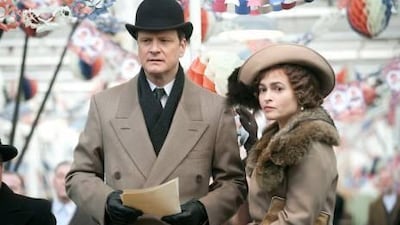Film-making in the UK, by turns moribund and vibrant, appears to be on a steady positive path, with a string of hits and Warner Bros' purchase of Leavesden Studios
The seven Golden Globe nominations for The King's Speech, starring Colin Firth and Helena Bonham Carter, cap another good year for the British film industry.
The announcement of the nominations last week follows news that Warner Bros has bought Leavesden Studios, north of London, and will give it a £100 million (Dh567.17m) revamp. The acquisition will make Leavesden - home to all eight Harry Potter films and many other blockbusters - the first major film production base outside the US since the Second World War.
It will also secure the future of the site now that Potter franchise is coming to an end, and safeguard some 1,500 jobs. More will be employed, with Warner's plans to create a Harry Potter museum on the 68-hectare site.
Film-making is booming in the UK. Despite the economic downturn, investment in British film reached £780m in the first nine months of the year, the highest on record, surpassing the £686.4m in the same period last year, according to the UK Film Council. Last year's figure was up 142 per cent on 2008.
Warner's decision to buy the studios it had been leasing for the last 10 years shows "its confidence in the skills and creativity of the UK film industry", says its chief executive, Barry Meyer.
The good times are also rolling for other studios such as Pinewood Shepperton, Elstree and Ealing. Parts of Manchester were recently cordoned off for the filming of scenes for Captain America: The First Avenger. Other sequels currently being shot in the UK include Pirates of the Caribbean: On Stranger Tides and X-Men: First Class.
Yet it was only about five years ago that the industry was in crisis, exemplified by Sony and MGM's decision to take the production of the James Bond film Casino Royale to the Czech Republic in 2006.
So what put it back on the path to recovery? The UK's vast resource of technical expertise and talented film-makers and actors has been a big attraction to film companies. However, the biggest inducement of all is money.
The Labour government knew it, and the Conservative-Liberal Democrat coalition government also understands it.
After the Casino Royale debacle, the Labour chancellor of the exchequer, Gordon Brown, who later became prime minister, introduced a tax credit for British films that went to producers and new rules that made it easier for Hollywood studios to qualify. This followed an earlier scheme favouring investors that was scrapped, after tax relief was claimed for films that were never made.
Mr Brown's tax credit, which the government will continue, is worth £100m a year today. This is a significant contribution to an industry that employs 44,000 and has up to 100,000 jobs dependent on it, and needs more than the £15m of lottery money that it gets annually.
The policy has certainly paid off with Leavesden, a big relief for the current government. Jeremy Hunt, the culture secretary, had been under fire for axing the UK Film Council, which the government believed had not worked. Its recent announcement that the British Film Institute would take over the running of the industry from 2012 has now been widely lauded.
But we have been here before in the world of movies: the boom in the 1910s, the slump in the 20s, up again in the 30s and down in the 40s. The golden age of the 60s was followed by a leaden one in the 70s, and the cycle goes on.
Film industry commentators believe that with the Leavesden expansion, the UK will be able to produce two to three extra blockbusters at any one time, on top of the four or five that the market leader Pinewood Shepperton can handle.
And never underestimate the grit of the British, as reflected by King George VI himself, whose hard-won success in overcoming his speech impediment is immortalised in The King's Speech.
The Golden Globe awards, which are decided by the Hollywood Foreign Press Association and will take place on January 16 - are generally an indication of how the Oscars will perform later. So have the Brits got it right this time?
By George, they probably have.

